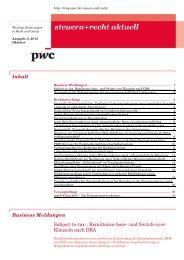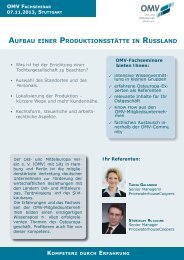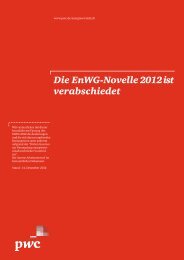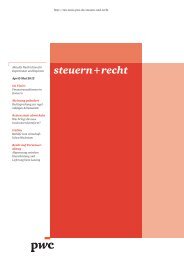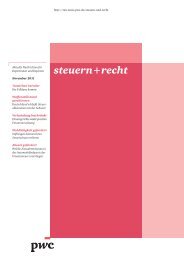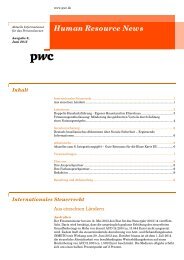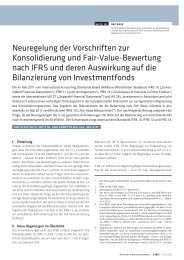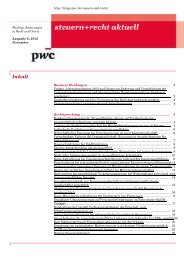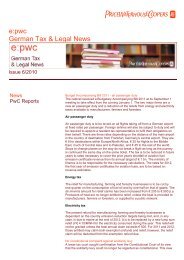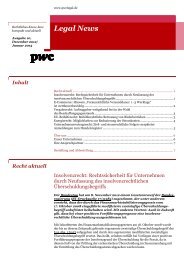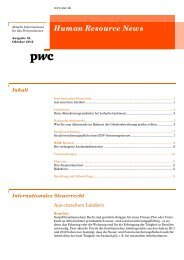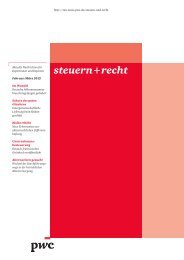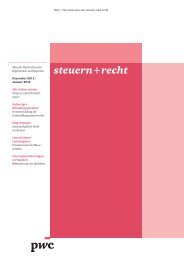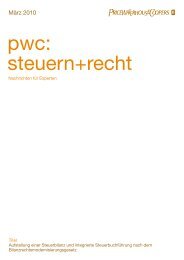Download legal-news-issue-7-2011 - PwC Blogs
Download legal-news-issue-7-2011 - PwC Blogs
Download legal-news-issue-7-2011 - PwC Blogs
Create successful ePaper yourself
Turn your PDF publications into a flip-book with our unique Google optimized e-Paper software.
Tax & Legal News October 13, <strong>2011</strong> 9<br />
regime is lost. This occurs on disposal of the ship or on its withdrawal from international<br />
routes, on the cessation of operations, or – in proportion – on the retirement of a partner<br />
from a shipping partnership. Once one of these events occurs, the supplementary amount<br />
is added to the current trading income of the taxpayer.<br />
A former member of a shipping partnership has just lost a case before the Supreme Tax<br />
Court on his claim that the supplementary amount falling to taxation on his retirement be<br />
seen as a (tax privileged) capital gain. He based his argument on the contention that the<br />
tax liability was triggered by his retirement; therefore it was directly connected with the<br />
disposal of his partnership share. The Supreme Tax Court, however, chose to follow its<br />
previous case law in holding that the income in question was trading income falling to<br />
normal scale rate taxation. It made the point that the supplementary amount had been<br />
established the time of the change in tax status of the partnership. It was thus linked<br />
thereto and retained its status of trading income, not least because the trading losses<br />
leading to the build-up of intangibles had already been deducted by the taxpayer as such.<br />
The amount was based on the historical fact of the hidden reserves at the time of the<br />
changeover; the deferral of the tax charge did not change the nature of the income.<br />
Supreme Tax Court judgment IV R 42/10 of July 9, <strong>2011</strong>, published on September 7<br />
Immediately diluted share purchase is purchase of reduced holding<br />
A future director acquired a 12.6% holding in a GmbH. A shareholders' meeting was held<br />
immediately afterwards to resolve a capital increase to be taken up in full by other<br />
shareholders. His relative holding thus fell to 0.02%. Rather more than a year later, he<br />
sold his share, realising a not inconsiderable capital gain. Under the then law, capital<br />
gains on the sale of shares held privately for more than one year were tax-free unless the<br />
recipient had held at least 10% of the <strong>issue</strong>d share capital of the company at any time<br />
during the previous five years. The tax office saw this exception as fulfilled with the<br />
purchase of the 12.6% share and assessed income tax on the gain in the year of sale. The<br />
shareholder argued that he had acquired his investment for the specific and agreed<br />
purpose of voting in favour of the capital increase. Since this increase necessarily led to<br />
the immediate dilution of his shareholding, he had, effectively, never held more than the<br />
diluted proportion of 0.2%. This, though, was well below the !0% limit for taxing the<br />
capital gain.<br />
The Supreme Tax Court has now sided with the taxpayer. The share purchase and capital<br />
increase resolutions were passed in one sitting in the lawyer's offices and were parts of the<br />
same transaction. That the one resolution necessarily preceded the other in law, did not<br />
mean that the two could not be regarded as a single act for tax purposes. Taxation was<br />
based on the substance of transactions rather than on their <strong>legal</strong> form, and the substance<br />
here was that the taxpayer at no time effectively disposed over a shareholding of more<br />
than 0.2%.<br />
In the meantime, capital gains taxation has been revised and gains on the sale of any<br />
shares acquired in 2009 or later are always taxable, regardless of the circumstances of the<br />
investment. The case therefore has no meaning as a planning guide for the future,<br />
although it is of importance in drawing tax conclusions from interlinked transactions,<br />
establishing, as it does, yet again that interlinked transactions should be taken as a single<br />
event, if such is the substance of the occurrence.<br />
Supreme Tax Court judgment IX R 32/10 of May 25, <strong>2011</strong> published on October 5<br />
Reverse charge VAT entitles foreign business to full input tax refund<br />
An Austrian business performed services in Germany subject to VAT by reverse charge.<br />
During the year under review it purchased certain building services in Germany from a<br />
foreign supplier. This made it liable to file a VAT return in order to account for its reverse<br />
charge obligation on the services purchased. It did so after year end and claimed a<br />
deduction for its input tax borne throughout the year. The tax office refused this claim<br />
insofar as it related to periods prior to the reverse charge obligation, saying that the<br />
Austrian business was then without German taxable turnover and could have, and should<br />
have, filed a refund claim as a foreign business.<br />
The Supreme Tax Court has now sided with the taxpayer. A VAT return is an annual<br />
return and thus encompasses all relevant transactions of the year. On the other hand, the<br />
business was unaware of its filing requirement before its purchase of its reverse charge<br />
input. At that time, it could have availed itself of the foreign business refund claim<br />
procedure for EU (and for many foreign) businesses. That procedure sets the refund claim



